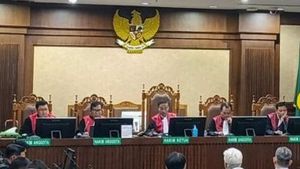JAKARTA - Pagebluk COVID-19 has forced the world community to adapt to new conditions and life arrangements. No exception for businesses that also have to prepare to go to a new normal. However, there are still several state-owned enterprises (BUMN) businesses that are not yet ready for this new order.
The Indonesian government will implement a new normality scenario taking into account epidemiological studies and regional preparedness. Like it or not, whether we want it or not, everyone is now forced to want to do something that was previously considered unusual or abnormal to become something normal, general, or just ordinary in the midst of the COVID-19 outbreak.
Special Staff to the Minister of BUMN, Arya Sinulingga, said that around 6 percent of the 142 BUMN companies were not ready to face this new normal scenario. This is because these companies have not reported their readiness to the Ministry of BUMN.
"Until yesterday, 14 percent had submitted, but today only 6 percent have not submitted it," he explained to reporters in Jakarta, Wednesday, May 27.
Arya emphasized that what he meant by being unprepared was in terms of business reports, company protocols and the company's unpreparedness to prepare everything that had to be submitted.
"PT PANN (Persero), PT Kertas Kraft Aceh (Persero), PT PPI (Persero), are not ready. But almost all of the others are ready to welcome the new normal," he said.
According to Arya, those who have not reported their readiness to return to normal will be a separate note for BUMN Minister Erick Thohir. However, Arya did not explain in detail about this.
PT Kereta Api Indonesia (Persero) / KAI was also said to be slow in conveying the company's plans to welcome this new normal. However, Arya stressed, this public transportation company had submitted its plan to the ministry.
"Now KAI is ready. They are ready for both public service and office readiness," he said.
Reduction of Employees Working from the OfficeArya said, in the new normal period, the number of BUMN employees who will work from office (WFO) will decrease by 20 percent. This is because workers who will be in office are required to be under 45 years old. Meanwhile, those above that age are likely to work from home or work from home (WFH).
"But productivity remains high, meaning there is no decrease in worker productivity," he explained.
Regarding when BUMN employees return to work in new normal conditions, said Arya, it depends on their respective regions. If the regional PSBB is revoked, it can run a new normal scenario and BUMN employees are ready to enter.
The English, Chinese, Japanese, Arabic, and French versions are automatically generated by the AI. So there may still be inaccuracies in translating, please always see Indonesian as our main language. (system supported by DigitalSiber.id)













